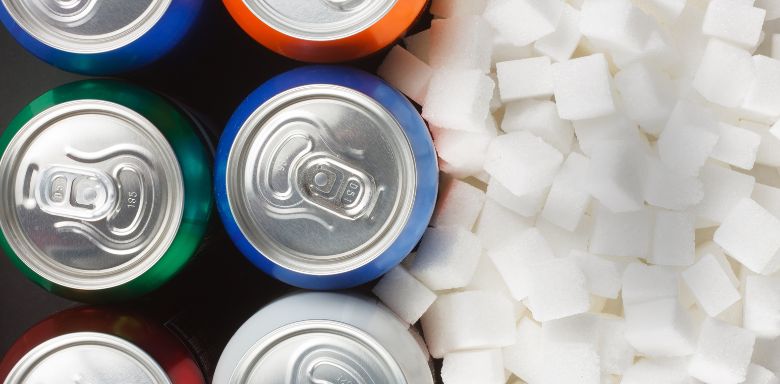Sip Wisely to Avoid Flare-ups
When you have ulcerative colitis, certain drinks can inflame the lining of your large intestine, leading to painful flare-ups. Choosing the right beverages is just as important as picking the right foods, so understanding what to skip—and what to sip instead—can help you feel more in control of your symptoms.
Many common beverages contain ingredients like caffeine, artificial sweeteners, high acidity, or carbonation, all of which can irritate your already sensitive digestive tract. By staying hydrated with gentler options, you’ll support healing and minimize the risk of bowel urgency, bloating and abdominal pain. Below are seven drinks to avoid if you have ulcerative colitis, and soothing alternatives to try.
1. Fizzy Foes: Carbonated Sodas
You should avoid carbonated sodas because the bubbles expand in your gut and can lead to uncomfortable gas, bloating and cramping. In addition, the high sugar content or artificial sweeteners in most sodas can disrupt your gut bacteria and feed harmful microbes that worsen inflammation in the colon. This buildup of gas and pressure on inflamed tissue often translates into sharp abdominal pain and urgent bowel movements.
Instead of bubbly soda, reach for flat or gently flavored water. Infuse plain water with slices of cucumber, strawberries or fresh mint for a refreshing taste without the fizz or added sugars.
2. Too Much Buzz: Caffeinated Coffee
Caffeinated coffee is a common culprit for ulcerative colitis flare-ups because its acidity and caffeine content stimulate your intestines and can trigger diarrhea and painful abdominal cramps. The rapid gut motility caused by caffeine can also lead to dehydration if you’re already experiencing loose stools, compounding the severity of your flare.
Switching to decaffeinated coffee or herbal coffee substitutes made from roasted chicory or dandelion root allows you to enjoy a warm, rich beverage without overstimulating your digestive system.
3. Energy Overload: Energy Drinks
Energy drinks often contain high levels of caffeine, sugar and synthetic additives that place extra stress on your nervous system and gastrointestinal tract. When you consume these beverages, the caffeine surge can worsen inflammation in your colon, increase heart rate and trigger anxiety, making gastrointestinal symptoms like cramping and diarrhea more intense.
A better choice is natural hydration from coconut water, which provides electrolytes and gentle sweetness, or herbal teas such as ginger or peppermint, which can offer a mild energy boost without irritating additives.
4. Party Pitfall: Alcoholic Beverages
Alcoholic drinks are notorious for irritating the lining of the gut, disrupting the balance of beneficial bacteria and interacting poorly with medications prescribed for ulcerative colitis. Even moderate consumption can cause dehydration, increased bleeding risk and inflammation that leads to diarrhea and abdominal pain.
If you’re craving a festive beverage, try alcohol-free beer or create a homemade spritzer by mixing sparkling water with a splash of 100% pomegranate or cranberry juice to capture the celebratory feel without the downsides.
5. Tea Temptations: High-Caffeine Teas
While tea is often considered soothing, black tea and many green teas contain both caffeine and tannins, which can increase acid production and tighten intestinal muscles, resulting in painful spasms and worsened inflammation.
To calm your digestive tract, opt for herbal teas like chamomile, rooibos or slippery elm, all of which are naturally caffeine-free and have anti-inflammatory properties that can help reduce mucosal irritation and support gentle digestion.
6. Citrus Quicksand: Acidic Fruit Juices
Juices made from oranges, grapefruits, lemons and limes are highly acidic and can exacerbate heartburn, acid reflux and inflammation in the colon. Drinking these juices may lead to burning sensations, increased stomach acid production and watery stools that further irritate ulcerative colitis symptoms.
A milder option is diluted apple or pear juice (mix at least half water), or smoothies made with low-acid fruits such as ripe bananas and peeled, seedless melon blended with non-dairy milk for a creamy, gut-friendly treat.
7. Dairy Delusion: Milkshakes and Creamy Smoothies
Dairy-based beverages like milkshakes and creamy smoothies can spell trouble because many people with ulcerative colitis are also lactose intolerant. Undigested lactose ferments in the gut, producing gas and attracting extra water into the intestines, which leads to bloating, cramping and diarrhea.
To enjoy a cool, flavorful drink without the drawbacks, blend non-dairy milks—such as almond, oat or coconut milk—with low-acid fruits like bananas and peeled apples, and add a spoonful of smooth nut butter for protein and richness.
Hydration Hacks for a Happier Gut
Beyond selecting the right beverages, aim to sip small amounts throughout the day rather than guzzling large volumes at once. Room-temperature drinks are often easier to tolerate than very cold or very hot beverages. Adding a pinch of salt and a squeeze of lemon to your water can help balance electrolytes without adding significant acidity.
Staying Ahead of Flare-Ups
Knowing what drinks to avoid with ulcerative colitis is a dynamic process that involves tracking symptoms, adjusting your diet and collaborating with healthcare professionals. By steering clear of carbonated sodas, high-caffeine drinks, acidic juices and alcohol, you’ll minimize common triggers and support a calmer digestive environment. With the alternatives listed here, you can continue to enjoy flavorful, hydrating beverages that nourish rather than agitate. Stay proactive, listen to your body and tweak your drink choices to discover what works best for you.
